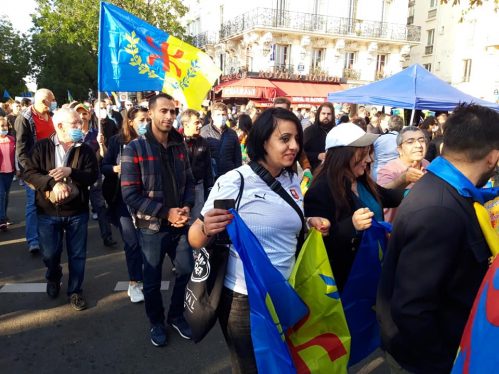When Stina attended the Conservatory of Classical Music in Helsinki, Finland, she did not know that one day she was going to sing in Kabylia. It’s because Stina “met” the Kabyle song in a cafe. A chance meeting with Kabyle students in a café in the Finnish capital. Her first home port was the song Aya lxir-inu from Idir.
By dint of perseverance, she was able to resume brilliantly several texts of famous singers. Telt iyam of Lounis Aït Menguellet, Ad zzi saâ of Slimane Azem, A ttir isahen of Mokrane Agawa, Lbaz of Ideflawen, Izriw yeghleb lehmali, the recovery of Sheikh el-haj M’hamed El-Anka by Lounès Matoub, master pieces with the tone of her voice that invites to travel. Stina also honors Kabyle singers such as Taos Amrouche, Hnifa, Cherifa and Nora in a song she composed herself.
The Finnish has thus enabled Kabyle music to expand its audience on a global scale. With classical arrangements on the piano, she reached an audience that, perhaps, has never heard of Kabyle music. Coming from a family of artists, Stina bathed since childhood in classical music partitions.
From her great-grandmother Ellen Malmberg, a great opera singer in the 19th century to her father, a member of the National Orchestra of Finland, and her uncle, composer of classical music during the 1940s and 1950s, all her family bathed for ages in music. Her brothers are members of a metal band.
It is therefore this fertile artistic milieu that facilitated the adoption of Kabyle music by Stina. The phonetics of her mother tongue, Finnish, had to help her too. We find, in fact, common sounds in Finnish and Kabyle. This is not the case with Latin languages for example. “I found some difficulties because there are no partitions available. I counted on the auditory memory, “said Stina, whom we met during her concert on Saturday in Montreal, at the invitation of the troupe Tilleli.
Her tour of Algeria during her participation in the European Cultural Festival in 2015 made her discover an audience that has already adopted the Finnish artist.
Stina, who has a two-year-old daughter named Dihya, is preparing her first album entirely in Kabyle. “I’m in full composition, I still have some pieces and some texts to finalize,” she says, before confessing to be eager for the project to succeed.
Yahia Arkat




I was born in a small village on a plateau overlooking the Mediterranean Sea, in my previous life.
A younger woman, who unloaded heavy firewood from her back, unties the lines that bound me, and lifts me out of the cradle.
I think of her nostalgic smile.
The place, where I must return to someday, is my eternal little stone house lit by the autumn sun the Kabylie Plateau.
Greetings from Japan.